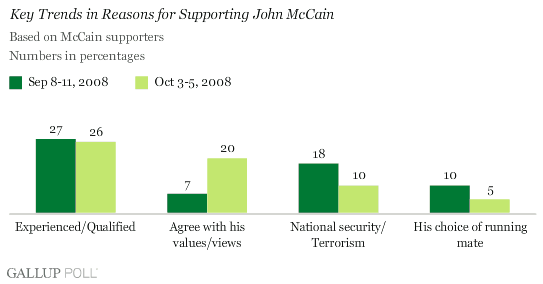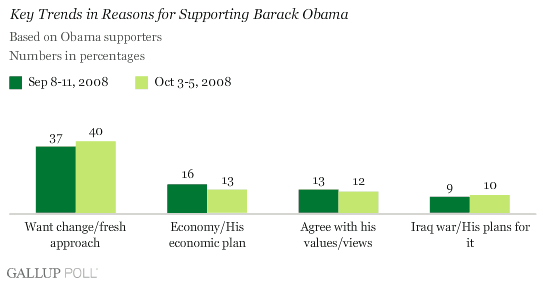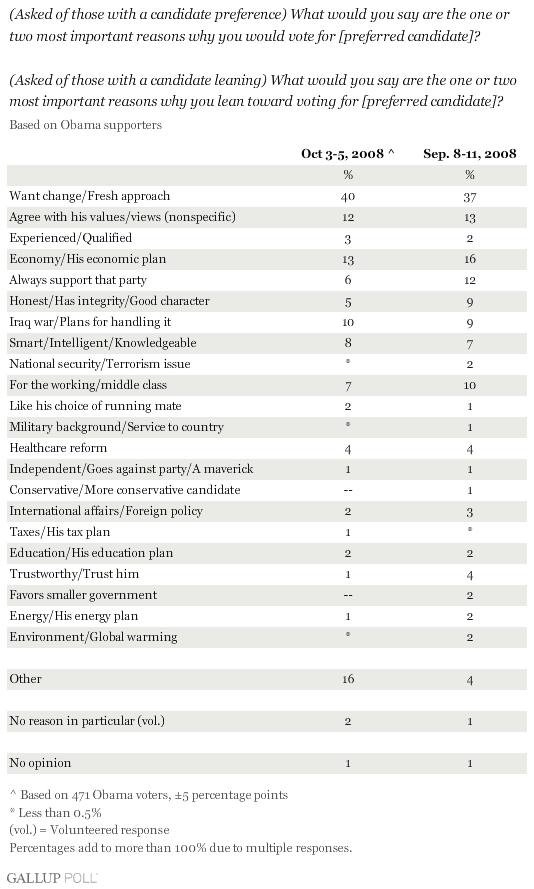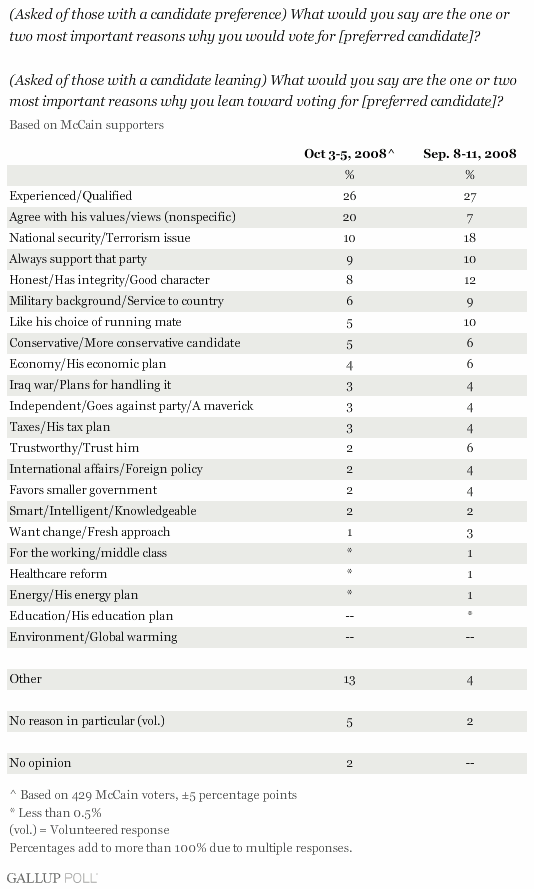PRINCETON, NJ -- More of John McCain's voters cite his "values" or "views" as one of the main reasons they are supporting him for president today than did so a month ago: 20%, up from 7% in early September. McCain's values and views now compete with his experience and qualifications (26%) as the top draw for his voters.

According to the new Gallup Poll, conducted Oct. 3-5, slightly fewer McCain voters today than a month ago mention either national security concerns or Alaska Gov. Sarah Palin's presence on the ticket as the main reason they are supporting McCain.
Gallup's initial measure of voters' reasons for choosing their candidate was conducted Sept. 8-11, shortly after the Republican National Convention, when McCain was slightly ahead in the race. Gallup Poll Daily tracking from Sept. 8-10 showed him leading Obama by 48% to 44%. The new Oct. 3-5 poll is contemporaneous with Gallup Poll Daily tracking showing Obama with an 8-point lead, 50% to 42%.
In the period between surveys, the nation became embroiled in a major economic crisis, and also had the chance to see the candidates face off in a presidential debate. Both of these factors could explain the shifts in what McCain voters say compels them to back him for president, particularly in terms of the increase in those citing his values and views. However, there has been no real change in the small number specifically mentioning the economy or McCain's economic views (now 4%, versus 6% in September).
Despite the significant increase in voter support for Obama since Sept. 8-11, Gallup finds little change in the voting mindset of his supporters. The dominant rationale they give for favoring Obama -- mentioned by 40% of his supporters in Gallup's Oct. 3-5 survey -- is that he represents change or a "fresh approach." Lower-ranked factors, mentioned by at least 10% of his voters, include his economic proposals (13%), his plans for handling the Iraq war (10%), and his views more generally (12%).

As with McCain's voters, Obama's voters are no more likely to mention the economy today than they were in September.
Aside from the factors already mentioned, supporters of both major-party candidates mention a variety of other candidate positions and traits. Small percentages of Obama's voters (fewer than 10%) cite his intelligence (8%), support for the working/middle class (7%), honesty (5%), and position on healthcare reform (4%). Fewer than 10% of McCain's voters cite his honesty (8%), his military background (6%), and his conservative views (5%).
In early September, McCain's voters were 10 times more likely than Obama's voters to cite their candidate's running mate as the primary reason they were voting for their chosen candidate, 10% vs. 1%. Today, McCain's voters are only about twice as likely to do this, 5% vs. 2%.
Bottom Line
Obama's voters see him primarily as an agent of change. Relatively few of his supporters mention other specific issues associated with him, including the economy. This hasn't changed over the past month, despite the enormous changes in the economic landscape, which have largely benefited Obama's candidacy in Gallup's pre-election polling.
McCain's image has sharpened somewhat over the past month. In early September, five different factors emerged as important to at least 10% of his supporters: his experience, national security, his honesty and integrity, his being a Republican, and his choice of a running mate. Today, there are only three: his experience, his values and views, and national security.
There is little overlap in the top factors identified by each set of voters: In sharp contrast to the 40% of Obama's voters citing change, only 1% of McCain's voters mention this. Similarly, whereas 26% of McCain's voters mention McCain's experience and qualifications, only 3% of Obama's voters say the same about Obama.
Survey Methods
Results are based on telephone interviews with 1,011 national adults, aged 18 and older, conducted Oct. 3-5, 2008. For results based on the total sample of national adults, one can say with 95% confidence that the maximum margin of sampling error is ±3 percentage points.
Interviews are conducted with respondents on land-line telephones (for respondents with a land-line telephone) and cellular phones (for respondents who are cell-phone only).
In addition to sampling error, question wording and practical difficulties in conducting surveys can introduce error or bias into the findings of public opinion polls.


